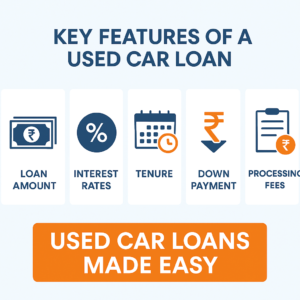
Purchasing a used car is a cost-effective alternative to buying a brand-new vehicle. For many, a used car loan serves as a practical solution to finance this investment. This guide delves into the details of used car loans, covering everything from eligibility to application and management.
A used car loan is tailored to assist individuals in acquiring pre-owned vehicles. Offered by banks, NBFCs, and credit unions, these loans come with terms that consider the vehicle’s depreciated value, often resulting in slightly higher interest rates than new car loans.
Contents

A used car loan is a type of financing provided by banks, NBFCs (Non-Banking Financial Companies), or online lenders that allows you to purchase a second-hand or pre-owned car. Just like new car loans, used car loans are paid back in monthly EMIs (Equated Monthly Installments) over a fixed tenure, along with applicable interest.

Owning a car is a major milestone, and for many, a car loan makes this dream a reality. But what happens once the loan is already active? Understanding the key features of an existing car loan can help you manage your finances better, explore refinancing options, or even plan for early repayment.
Let’s dive into the essential aspects of an existing car loan that every borrower should know.
The tenure of your car loan refers to the total repayment period. Typically, existing car loans range between 12 to 84 months. A longer tenure means lower EMIs but more interest paid overall, while a shorter tenure reduces interest but increases monthly payments.
Car loans usually come with either a fixed or floating interest rate:
Fixed Rate: EMI stays the same throughout the loan period.
Floating Rate: EMI may vary depending on market conditions.
Knowing your loan’s interest structure helps you plan finances accordingly or evaluate if refinancing could reduce your burden.
Your existing car loan has a remaining principal balance — the amount you still owe to the lender. It’s important to track this regularly, especially if you’re considering prepayment, refinancing, or selling the vehicle.
Your Equated Monthly Installment (EMI) includes both principal and interest. The EMI schedule of your loan determines how much you’ll pay each month. Some borrowers also opt for flexi EMI options offered by a few lenders.
Many car loans allow prepayment (partial payment before due date) or foreclosure (complete loan repayment before tenure ends). However, some lenders charge a penalty for early repayment. Check your loan terms before making extra payments.
If you’re considering refinancing your existing car loan, transferring it to another lender, or simply evaluating your current financial standing, understanding the eligibility criteria is crucial. While taking a new car loan and refinancing an existing one may differ slightly, the basic parameters remain largely the same.
Most banks and NBFCs require the borrower to be within a certain age bracket:
Salaried Individuals: 21 to 60 years
Self-employed Professionals: 21 to 65 years
You should not exceed the maximum age by the time the loan matures.
Lenders evaluate your employment status to assess your repayment capacity:
Salaried Applicants: Minimum of 1 year of work experience, with at least 6 months in the current job.
Self-employed Applicants: At least 2 years of business continuity.
Stable income is key to improving your loan eligibility.
Most lenders set a minimum income requirement to ensure you can manage EMI payments:
Salaried: ₹15,000 – ₹25,000 per month (varies by city and lender)
Self-employed: Based on net profit and ITR filings
Higher income often allows you to negotiate better terms or opt for refinancing.
A credit score of 650 or above is usually required to qualify for a new loan on an existing car. If you’re refinancing or applying for a top-up loan, lenders check your repayment history and credit utilization.
Low CIBIL scores can reduce eligibility or lead to higher interest rates.
The current age of the vehicle also affects your loan eligibility. Most lenders prefer refinancing cars that are less than 5–7 years old. The resale value of the car plays a big role in determining the loan amount.
If your car is too old, refinancing may not be possible or profitable.
Your repayment record on the existing car loan significantly influences eligibility:
No missed EMIs or penalties
No history of loan restructuring
Clean payment history improves trust and lowers risk for lenders
Lenders often have location-specific criteria, especially when it comes to vehicle valuation, documentation, and loan approval. Borrowers in metro cities might have access to better interest rates and loan options.
To be eligible, you need to provide:
PAN card & Aadhaar card
Address proof (utility bill, rent agreement, etc.)
Salary slips or income proof
Bank statements
Existing loan documents (if refinancing)
Vehicle RC and insurance
Pre-owned vehicles are more affordable, and a loan makes it even easier to own one without full upfront payment.
Choose repayment tenures that suit your financial situation—from 1 year to 5 years.
If all documents are in order, many lenders offer fast loan disbursal—sometimes within 24–48 hours.
Timely repayment of your used car loan can help you build or improve your credit score, which is helpful for future loans.
Check the car’s condition: A well-maintained vehicle has higher financing potential.
Compare interest rates: Shop around for the best deal across banks and NBFCs.
Read the terms carefully: Look for hidden charges, foreclosure penalties, or insurance tie-ups.
Verify the seller’s documents: Ensure all vehicle papers are genuine and up-to-date.
At Networth Advisory, we make your car ownership journey smooth and hassle-free. Whether you’re buying your first vehicle or upgrading to a better one, our used car loan solutions come with flexible repayment options, competitive interest rates, and quick approvals. Let us help you drive your dream car without straining your finances.
Apply now with Networth Advisory and hit the road with confidence and convenience!